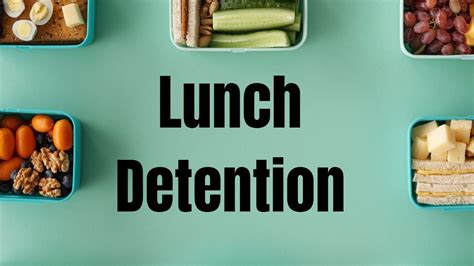Lunch detention is a form of disciplinary action typically enforced in schools, where students who have violated school rules are required to spend their lunch break in a supervised setting. The purpose of lunch detention is to provide an opportunity for students to reflect on their behavior and complete any missed assignments or tasks.

Types of Lunch Detention
There are several types of lunch detention, including:
- Reserved Lunch: Students are required to remain in a designated area during their lunch break, often under the supervision of a teacher or staff member.
- Structured Lunch: Students are assigned to complete specific tasks or activities during their lunch period, such as completing homework, detention worksheets, or community service projects.
- Extended Lunch: Students are required to stay after school for a longer period during their lunch break to complete their detention time.
- Behavioral Lunch: Students are placed in a separate room or area specifically designed for students who have displayed problematic behaviors during their lunch period.
Reasons for Lunch Detention
Lunch detention is typically assigned for a range of offenses, including:
- Tardiness or absence
- Disruptive behavior
- Disrespect to teachers or staff
- Bullying or harassment
- Cheating or plagiarism
- Dress code violations
- Failure to complete assignments
Consequences of Lunch Detention
Lunch detention can have several negative consequences for students, including:
- Missed social interactions with peers
- Missed nutritional opportunities
- Loss of free time
- Negative impact on academic performance
- Increased likelihood of future behavior problems
Strategies for Avoiding Lunch Detention
Students can take several steps to avoid receiving lunch detention, such as:
- Be on time for class and school activities.
- Follow school rules and policies.
- Be respectful to teachers, staff, and classmates.
- Complete assignments on time and to the best of their ability.
- Avoid engaging in disruptive or inappropriate behaviors.
Pros and Cons of Lunch Detention
Pros:
- Provides an opportunity for students to reflect on their behavior.
- Can deter students from engaging in future misbehavior.
- Allows students to make up for missed work or complete assignments.
- Creates a structured environment for students who struggle with behavior.
Cons:
- Can have negative consequences on students’ social and academic development.
- May not be effective in deterring all students from misbehavior.
- Can create a sense of punishment and resentment.
- Can be difficult to implement and manage effectively.
Frequently Asked Questions (FAQs)
1. What is the purpose of lunch detention?
Lunch detention is intended to provide students with an opportunity to reflect on their behavior and complete any missed assignments or tasks.
2. What are the different types of lunch detention?
Lunch detention can include reserved lunch, structured lunch, extended lunch, and behavioral lunch.
3. What are the consequences of receiving lunch detention?
Consequences may include missed social interactions, nutritional opportunities, free time, and a negative impact on academic performance.
4. How can students avoid receiving lunch detention?
Students can avoid lunch detention by being on time, following school rules, being respectful, completing assignments, and avoiding disruptive behaviors.
5. Is lunch detention an effective disciplinary measure?
The effectiveness of lunch detention varies depending on the individual student and the school environment.
6. What alternatives to lunch detention exist?
Alternatives may include peer mediation, behavior contracts, and restorative justice practices.
7. How can parents support students who are receiving lunch detention?
Parents can support their children by discussing the reasons for the detention, setting expectations for future behavior, and providing encouragement and support.
8. What role do teachers play in lunch detention?
Teachers are typically responsible for assigning and supervising lunch detention, providing students with opportunities to complete assignments, and creating a positive and supportive environment.
